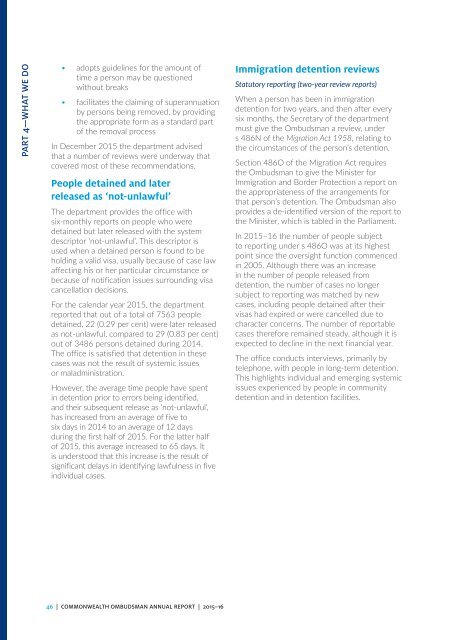15–16
ombudsman-annual-report15-16
ombudsman-annual-report15-16
You also want an ePaper? Increase the reach of your titles
YUMPU automatically turns print PDFs into web optimized ePapers that Google loves.
PART 4—WHAT WE DO<br />
• adopts guidelines for the amount of<br />
time a person may be questioned<br />
without breaks<br />
• facilitates the claiming of superannuation<br />
by persons being removed, by providing<br />
the appropriate form as a standard part<br />
of the removal process<br />
In December 2015 the department advised<br />
that a number of reviews were underway that<br />
covered most of these recommendations.<br />
People detained and later<br />
released as ‘not-unlawful’<br />
The department provides the office with<br />
six-monthly reports on people who were<br />
detained but later released with the system<br />
descriptor ‘not-unlawful’. This descriptor is<br />
used when a detained person is found to be<br />
holding a valid visa, usually because of case law<br />
affecting his or her particular circumstance or<br />
because of notification issues surrounding visa<br />
cancellation decisions.<br />
For the calendar year 2015, the department<br />
reported that out of a total of 7563 people<br />
detained, 22 (0.29 per cent) were later released<br />
as not-unlawful, compared to 29 (0.83 per cent)<br />
out of 3486 persons detained during 2014.<br />
The office is satisfied that detention in these<br />
cases was not the result of systemic issues<br />
or maladministration.<br />
However, the average time people have spent<br />
in detention prior to errors being identified,<br />
and their subsequent release as ‘not-unlawful’,<br />
has increased from an average of five to<br />
six days in 2014 to an average of 12 days<br />
during the first half of 2015. For the latter half<br />
of 2015, this average increased to 65 days. It<br />
is understood that this increase is the result of<br />
significant delays in identifying lawfulness in five<br />
individual cases.<br />
Immigration detention reviews<br />
Statutory reporting (two-year review reports)<br />
When a person has been in immigration<br />
detention for two years, and then after every<br />
six months, the Secretary of the department<br />
must give the Ombudsman a review, under<br />
s 486N of the Migration Act 1958, relating to<br />
the circumstances of the person’s detention.<br />
Section 486O of the Migration Act requires<br />
the Ombudsman to give the Minister for<br />
Immigration and Border Protection a report on<br />
the appropriateness of the arrangements for<br />
that person’s detention. The Ombudsman also<br />
provides a de-identified version of the report to<br />
the Minister, which is tabled in the Parliament.<br />
In 20<strong>15–16</strong> the number of people subject<br />
to reporting under s 486O was at its highest<br />
point since the oversight function commenced<br />
in 2005. Although there was an increase<br />
in the number of people released from<br />
detention, the number of cases no longer<br />
subject to reporting was matched by new<br />
cases, including people detained after their<br />
visas had expired or were cancelled due to<br />
character concerns. The number of reportable<br />
cases therefore remained steady, although it is<br />
expected to decline in the next financial year.<br />
The office conducts interviews, primarily by<br />
telephone, with people in long-term detention.<br />
This highlights individual and emerging systemic<br />
issues experienced by people in community<br />
detention and in detention facilities.<br />
46 | COMMONWEALTH OMBUDSMAN ANNUAL REPORT | 20<strong>15–16</strong>


